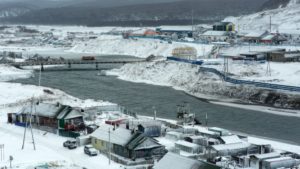Special to WorldTribune.com
Radio Free Europe / Radio Liberty
Russian President Vladimir Putin and Japanese Prime Minister Shinzo Abe have discussed possible joint economic projects on an island chain both countries claim, but no breakthrough was reported in the territorial dispute that has poisoned ties since World War II.

The dispute over the islands seized by Soviet forces at the end of the war has hobbled relations ever since, preventing Russia and Japan from signing a peace treaty to formally end the war.
Russia calls the four islands the Southern Kuriles; Japan calls them the Northern Territories.
Abe said on Dec. 15 that he and Putin had “in-depth discussions” on a peace treaty during talks at a hot-springs resort in the Japanese city of Nagato.
He said the two leaders also discussed possible joint economic projects on the disputed islands.
Top Kremlin aide Yury Ushakov said Putin and Abe agreed to order experts from both countries to start “detailed consultations” on joint economic activities on the islands.
Asked whether these activities will be based on Russian legislation, Ushakov said, “Of course, since it is Russia’s territory.”
Russian officials have frequently urged Japan to focus on trade tries and investment in Russia rather than seeking to regain sovereignty over the islands.
The Russian and Japanese leaders will continue their talks in Tokyo on Dec. 16.
Putin is on his first official visit to a Group of Seven (G7) economic power since Russia seized Crimea from Ukraine in March 2014 and the G7 countries imposed sanctions on Moscow.
Lingering tensions over the islands have prevented the two countries from signing a peace treaty to formally end the war.
Abe has pledged to resolve the territorial dispute, in hopes of leaving a diplomatic legacy. But resolving the dispute carries risks for Putin, who does not want to tarnish his reputation at home for being a staunch defender of Russian sovereignty.
Putin told the Yomiuri newspaper this week that the goal of a peace treaty would be harder to achieve if Russia remained subject to Japanese sanctions.
But Japan has ruled out undermining Western sanctions on Russia that were imposed over its aggression in Ukraine.
